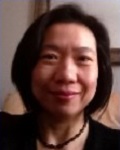
Ting Chang
Associate Professor in Art History, Faculty of Arts
Contact
Biography
After completing my PhD in art history at the University of Sussex I was assistant professor of art history at McGill University (Montreal) and then Carnegie Mellon University (Pittsburgh). In 2012, I joined the University of Nottingham after a research fellowship at the Clark Art Institute in Williamstown, Massachusetts, the Getty Research Institute in Los Angeles, and a research affiliation with the University of Pittsburgh.
Expertise Summary
My research principally concerns modern French art and culture. My book, Travel, Collecting, and Museums of Asian Art in Nineteenth-Century Paris was published by Ashgate in 2013 and is now available in paperback https://www.routledge.com/Travel-Collecting-and-Museums-of-Asian-Art-in-Nineteenth-Century-Paris/Chang/p/book/9781409437765. In this monograph I use European travelers and collectors of Asian art as vehicles to examine crosscultural exchange and power relations between France, Japan, and China. I look at the issues typically left out of museum histories such as the physical experiences of travel abroad and the foreign labours involved in transport and collecting. I show how travel - getting from one place to another -- unsettles dominant images of class, gender, and race. By moving away from existing models of japonisme or chinoiserie, I take a new path to understanding the impact of Asian art in Europe.
Teaching Summary
I will not be teaching in 2018-19 thanks to a Leverhulme Research Fellowship that allows me to focus on my project "Playing Empire in the Nineteenth Century: Games, Spectacles and Colonials… read more
Research Summary
In 2023 I had a short-term research fellowship at the Yale Center for British Art in New Haven, U.S.A. In 2020 I had a similar fellowship at the UCLA Clark Memorial Library. Both of these short-term… read more
I will not be teaching in 2018-19 thanks to a Leverhulme Research Fellowship that allows me to focus on my project "Playing Empire in the Nineteenth Century: Games, Spectacles and Colonials Subjects." My teaching normally covers modern European art through a number of critical themes. I teach materials ranging from the late 18th century to the early 20th century. One module looks at representations of labour and leisure in European and American art. Another looks at questions of mobility in art making from the middle of the 19th to the early 20th centuries. We look at new technologies of movement and communication, and how artists responded to them. A key question is the role of artists in naturalizing the equation between mobility, modernity, and the West. To this end, I will include non-Western representations to explore the ideological and economic implications of mobility. In general my approach is to examine the political, economic, social and cultural factors that shaped the production and reception of the arts.
Current Research
In 2023 I had a short-term research fellowship at the Yale Center for British Art in New Haven, U.S.A. In 2020 I had a similar fellowship at the UCLA Clark Memorial Library. Both of these short-term research fellowships were related to the Leverhulme Research Fellowship awarded from 1 September 2018 to 31 August 2019 for my project, "Playing Empire in the Nineteenth Century: Games, Spectacles and Colonial Subjects." I have revised the title to Touching History, Playing Empire, and Making Worlds. This book in progress investigates the ways in which educational objects designed for handling and manipulation activated viewer/players as co-creators of meaning. Maps and globes, map-based games, playing cards, and optical devices made in France and Britain between the 17th and 19th centuries claimed as their chief purpose the advancement of geographical knowledge. I argue that their aim was also to foster an imperial sensibility, and that touch intensified the European imperial gaze through bodily consumption. Neurologist Frank R. Wilson examines the interdependence of hand and brain function. David Howes, Roger Smith, and other phenomenologists argue that the tactile senses are the origin of deep experience and knowledge as active subjects in the world. I contribute to this theoretical framework by examining the interplay between handling and looking, imagining, narrating, and experiencing my objects of study through physical and cognitive engagement. I argue that long before the invention of virtual reality goggles and haptic suits, board games, toys, and peepshows made of paper, cardboard, and wood offered immersive experiences that powerfully shaped imperial and colonizing subjectivities. My study will be the first to propose that these pre-digital equivalents of video games, Xboxes, and virtual reality devices enabled a multisensory, imaginative, and ideologically formed understanding of early modern global relations. I examine the epistemologies and aesthetics of play within the historical context of European imperialism. Using paradigmatic examples produced in France and Britain, I consider the efficacy of tactility, visuality, and ludicity in promoting the imperial project. The three terms imply distinct spheres with tidy boundaries but are in fact porous. Play is the common key factor that activates intersensorialities. Attention to the distinct gestures required by board games, playing cards, maps and globes, and optical devices will shed light on areas of intermediality. I also explore the interpictoriality between the material culture of play and the rhetorics of grand manner painting.